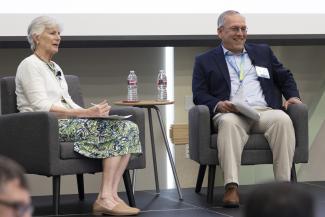NETL Director Marianne Walck delivered key insights at the Digital Innovation Center of Excellence (DICE) 2025 Digital Engineering Conference at Idaho National Laboratory (INL), participating in a panel discussing critical and emerging technologies in the energy sector.
The objective of the DICE event is to formalize and coordinate digital engineering, digital twinning, digital transformation, and artificial intelligence (AI) activities across next-generation energy systems. Walck joined INL Deputy Laboratory Director Todd Combs to highlight NETL's applied energy digital efforts and future research plans.
Walck emphasized that technologies like AI, combined with domain expertise at the lab, are addressing key challenges like advanced materials discovery and critical mineral recovery. The approach is redefining the pace of innovation and will improve how energy is produced, stored and delivered over the next decade.
She outlined how NETL is using AI and digital innovation with its lab, field, and computational expertise to address key energy challenges to accelerate materials discovery, identify next-generation energy resources and reduce computational costs. The work aligns with DOE's broader vision for AI to reshape the energy sector. She said national labs are uniquely positioned to lead research and accelerate discovery through autonomous science, digital twins evolution and optimization of computational efficiency.
Walck explained how NETL is spearheading key innovative projects. For example, its partnership with Cerebras Systems on Wafer Scale Engine technology is pioneering highly energy-efficient, scalable computing hardware for AI/ML and scientific simulations, significantly reducing energy and financial costs compared to conventional systems — a crucial step to address the massive computational power demanded by AI and optimize energy efficiency for simulations.
She said mineral discovery is another critical area where NETL's applies AI to accelerate discovery, including development of the world's first unconventional critical minerals resource forecasting model and identification of significant domestic resources from previously overlooked sources like coal waste and acid mine drainage. This research, exemplified by the partnership with Ramaco Carbon, reduces reliance on foreign supply and strengthens U.S. manufacturing.
Walck underscored the importance of collaboration, citing NETL's partnership successes across the national lab system, industry and academia. She said that public-private partnerships are vital for developing and deploying new energy technologies. University partnerships, like NETL’s work with the University of Pittsburgh on AI-enabled monitoring tools, are also critical.
Walck highlighted the NETL-led Minerals to Materials Supply Chain Research Facility (METALLIC) as an example of how a multi-lab collaboration work together to accelerate critical minerals and materials technologies. She also cited NETL’s high-permeance carbon capture membrane, installed at U.S. Steel, as an example of scalable and cost-effective carbon dioxide capture.
Addressing considerations related to AI-enhanced technologies trustworthiness, Walck stressed the importance of ensuring that applied energy digital solutions are informed by domain expertise, validated and explainable, especially as technologies scale. NETL's own multi-cloud-hosted Energy Data eXchange® (EDX) platform plays a key role in supporting these needs by providing public and managed access to curated data resources that accelerate collaborations for research teams through secure, cloud-hosted environment.
NETL is a U.S. Department of Energy (DOE) national laboratory dedicated to advancing the nation's energy future by creating innovative solutions that strengthen the security, affordability and reliability of energy systems and natural resources. With laboratories in Albany, Oregon; Morgantown, West Virginia; and Pittsburgh, Pennsylvania, NETL creates advanced energy technologies that support DOE’s mission while fostering collaborations that will lead to a resilient and abundant energy future for the nation.




